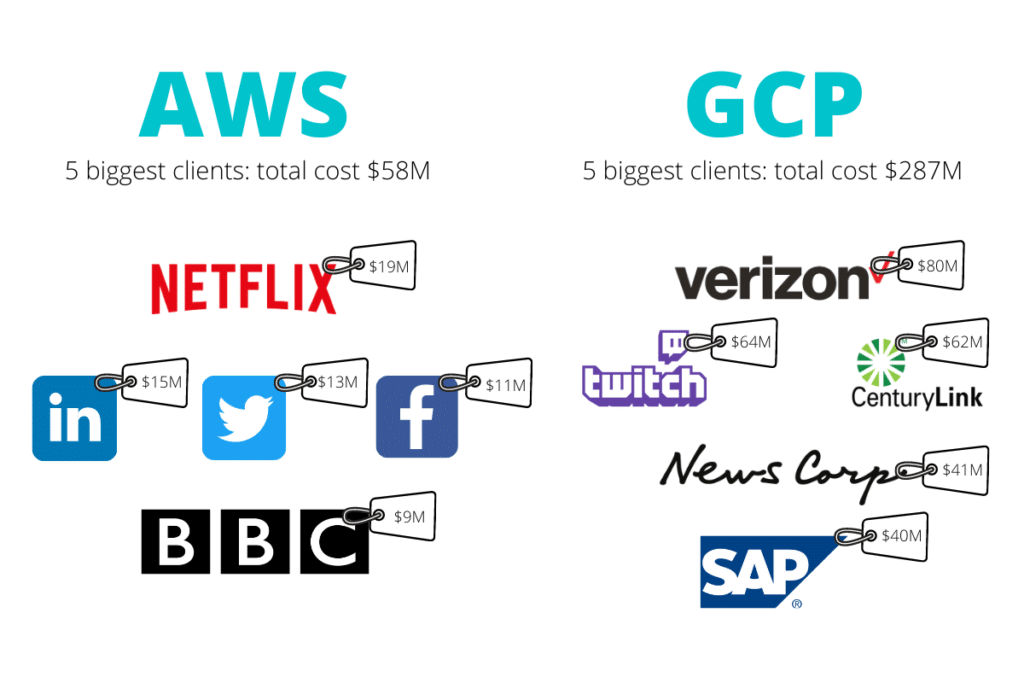AWS vs GCP 2024. Comparative Guide: CDN, Pricing, Biggest Drawbacks
Cloud computing is the future of the Internet and business services. Authority platforms, such as Statista and Synergy Research Group, continue to prove this fact in the reports year after year. The worldwide cloud computing market is on a steady rise and is projected to hit approximately $680 billion in 2024.
Top LaaS leaders like Amazon, Microsoft Azure, and Google collectively hold a 66% share. The latest statistic shows that AWS controls about 31% of the cloud market, followed by Azure with 24%, and GCP in third place with 11%.
Companies with global reach benefit substantially from spreading out their infrastructure into different cloud regions worldwide. For instance, streaming platform Netflix started to migrate its servers to AWS in 2008. The company found it would improve its customers’ streaming experience by building multiple AWS cloud regions. Nowadays, it uses more than 100,000 server instances on AWS. Cloud computing is also a sustainable solution, reducing environmental impact through efficient resource utilization and data center optimization.
If you want to migrate your company’s cloud services, you’ve probably come across Amazon Web Services and Google Cloud Platform. In this article, we will look at each service in-depth, compare them, and discuss whether it is worth your time migrating from AWS to GCP. Ready? Let’s go!
Why are AWS and GCP popular?
Both these technology giants have been dominating the LaaS market for years. They both offer hundreds of products to complete just about any problem that can be solved by web development. Each respected company has been in the game since the industry’s inception. AWS and GCP are expanding rapidly, separating themselves from most competitors by innovation and expanding their global networks.
Most of the world’s most valuable companies allow AWS or GCP to host their entire online platforms. Both continue to adapt to the ever-changing industry by providing the best service in cloud deployment, including – computing, networking, security, and storage.
AWS benefits and drawbacks
Amazon Web Services provides cloud computing services for companies of any size. AWS currently supports over 7,500 government agencies and over 14,000 educational institutions. AWS is easy to use and favored by many IT professionals and businesses due to its self-service platform containing hundreds of products on secure servers.
Benefits
By signing up for an AWS account, you are given access to Amazon’s infrastructure via its user-friendly interface. Browse through hundreds of products, allowing for easy deployment of programs, software, and entire IT ecosystems.
We recommended hiring an IT professional to manage your project, but Amazon does provide surprisingly easy-to-follow documentation. The same can’t be said about other technology giants.
Drawbacks
AWS billing is difficult to understand for those not familiar with the intricate workings of the internet. Reading a bill from AWS can be overwhelming, but if you know what you are doing, Amazon is very transparent. Besides, if you’re interested in whether is AWS cheaper than Google Cloud – no, it’s not.
Many companies are attracted to AWS because of its wide variety of tools and resources. Unfortunately for some, they won’t have access to everything available on the cloud computing platform. AWS limits its resources by region, which means some users will have to pay extra for certain services.
GCP benefits and drawbacks
AWS may control more space on the internet, but Google Cloud Platform is gaining popularity. AWS alternative – GCP strives to achieve greater integration with enterprise IT systems, as evidenced by increasing businesses embracing the platform. It has already enticed high-profile customers across various industries, such as Spotify, Target, and Goldman Sachs.
Benefits
Using GCP means access to Google’s massive network. Google has successfully created a private global fiber network. In 2022, Google announced 20 subsea cable projects, including building the most extended subsea cable in the world. The Topaz cable will run from Vancouver to Port Alberni and then across the Pacific Ocean to Mie and Ibaraki in Japan. Later, in October 2023, Google announced the South Pacific Connect initiative, introducing 2 transpacific subsea cables – Honomoana and Tabua – to enhance digital connectivity between Fiji, French Polynesia, the United States, and Australia, fostering economic growth and resilience in the Pacific region.
In case you build a minimum viable product – you can begin with a small version and gradually enhance it. App Engine perfectly suits this approach, allowing you to start small and scale up as needed with more infrastructure and features.
When it comes to which is cheaper, AWS or Google Cloud – Google Cloud is cheaper than AWS and Azure. The bill is on minute-level increments, only charging for the computing time that is used. Depending on the instance, GCP is 25-50% cheaper than AWS.
Drawbacks
GCP’s user interface is considered more difficult to use than AWS’s. Its documentation isn’t as clear, and its customer service isn’t perfect.
Google is catching up with available products but still is lagging behind AWS. You should also not overlook that many AWS-certified engineers are already in the market due to AWS’s dominant market share.

Comparison of the key features of GCP and AWS
Both companies are industry leaders with over a decade of experience in cloud computing and LaaS. AWS is considered to be easier to use and has a better UI. AWS also offers more products. On the other hand, Google has a larger network, and predicting your question, is GCP cheaper than AWS? Yes, it is. Also, the interface won’t be challenging for those familiar with working in the Google ecosystem.
CDN comparison
Amazon CloudFront
At the core of AWS is CloudFront. This CDN delivers data, videos, applications, and APIs quickly and securely over Amazon’s worldwide network of secure servers. The user-friendly platform empowers developers to customize features to meet the requirements of any project.
CloudFront is integrated with all AWS products. The pay-as-you-go pricing model doesn’t require any upfront charges and protects new users from using too many resources and overspending.
AWS’s CDN is easy to use with network and application-level protection. When using CloudFront, you are guaranteed fast content delivery, secure computing, and complete integration with AWS products, all billed out in a transparent pricing model.
Google Cloud CDN
Google’s CDN utilizes a massive global network to distribute content at unmatched speeds. Sites using Google Cloud CDN aren’t required to use regional DNS. Their single IP address can be used anywhere worldwide because of Google’s extensive infrastructure.
The Google Cloud Platform is fully integrated with Google’s CDN, and it supports up to 5TB objects, capable of managing the most complex traffic on Earth.Choosing Google means access to its network. This is the fastest and cheapest way to deliver and store content.
AWS VS GCP pricing 2024
Many people ask, is AWS expensive, or is GCP expensive? Well, comparing GCP vs AWS pricing is complicated. Each company charges differently for instances, objects, and block storage. Depending on the project and region, costs will vary.
AWS generally offers more flexible pricing options, with a range of on-demand, reserved, and spot instances that allow customers to choose the capacity level they need at a given time. AWS cloud server pricing also offers a wider range of options for its services, including pay-as-you-go, per-hour, per-second, and per-request billing.
Google Cloud, on the other hand, has a reputation for providing more predictable and consistent pricing with a focus on simplicity and transparency. Google Cloud bills in per-second increments for most services and offers committed use discounts and sustained use discounts for customers who commit to using a certain capacity level for a longer period.The only way to know exactly how much your business platform will cost using each provider’s cloud services is to enter various parameters into a calculator. Both AWS and GCP offer a calculator to give a cost estimate.
When you have to migrate? And do you really have to?
Comparing these tech giants isn’t easy. AWS currently controls more cloud space, but Google is catching up fast. AWS is regarded as more user-friendly, according to many developers. However, it’s easy to find a tech professional that prefers Google’s platform.
One area in which Google outstands itself from just about every other company on Earth is its network. For small companies, these delivery times are minute, but when dealing with large amounts of data being sent worldwide, it’s advantageous to have access to a massive network. Also, GCP is known for being at the forefront of innovation in areas such as artificial intelligence, machine learning, and data analytics.
It’s really hard to choose between equal things. Besides, it’s a lot about marketing – AWS has been longer on the market, and more engineers have worked with it and invested in it, however, this doesn’t make AWS better than its alternatives. Almost all features that are available on one platform are also available on the other.
Consider that GCP is often more cost-effective than AWS, particularly for long-term projects or workloads requiring large-scale data processing. Google Cloud pricing offers sustained use discounts, which means that if an organization uses a particular service consistently for an extended period, it will receive a discount on the usage cost. This can result in significant savings for workloads requiring continuous, long-term processing.In addition to performance, innovation, and cost, there are many other factors that organizations should consider involved in migrating from AWS to GCP. It is important to carefully plan and execute a migration to ensure a smooth transition and minimize any disruptions to business operations.






